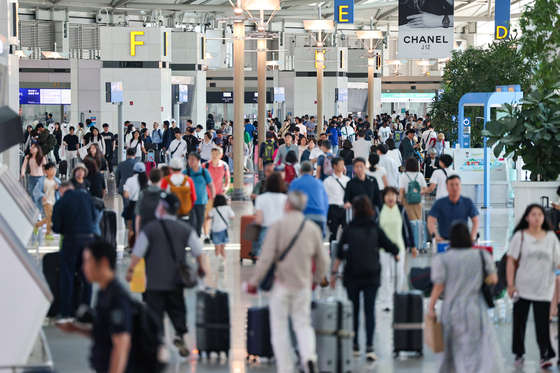![On June 5th, Incheon International Airport was packed with travelers. [YONHAP]](https://koreajoongangdaily.joins.com/data/photo/2024/06/17/f7325037-2d39-4678-8016-52d0dce25bb4.jpg)
On June 5th, Incheon International Airport was packed with travelers. [YONHAP]
The government will endeavor to make it easier for foreigners to enter Korea, apply for visas, and travel within the country, especially by public transportation.
The Ministry of Culture, Sports and Tourism announced proposals to boost inbound tourism aimed at boosting the domestic tourism industry as part of a meeting of economic ministers held on Monday morning.
The recovery plan will focus on extending the length of stay of visitors to Korea and promoting consumption in the domestic market. According to the Ministry of Culture, the number of tourists visiting Korea has increased as the COVID-19 pandemic subsided, but market revenue has been slow to recover. This is mainly because tourists’ main interest has shifted from shopping to cultural experiences, and people now prefer to travel in smaller groups than before.
Key plans include simplifying entry and visa application procedures for foreigners coming to Korea by air and cruise ship, making public transportation across the country more accessible to foreigners, improving mobile apps essential for travel, and holding a variety of foreigner-friendly events.
The government will hire more visa staff and expand existing visa application centers, and the Korea Electronic Travel Authorization (K-ETA) system, which allows group travelers to apply for entry documents before entering the country, will be opened up to accommodate a wider range of travellers and to provide services in a wider range of languages.
![Tourists disembark from the Celebrity Millennium cruise ship in Busan on May 22. [NEWS1]](https://koreajoongangdaily.joins.com/data/photo/2024/06/17/70df8e4b-9d76-4836-bc90-6272af114627.jpg)
Tourists disembark from the Celebrity Millennium cruise ship in Busan on May 22. [NEWS1]
![June 11, Cheonggyecheon Stream in central Seoul [NEWS1]](https://koreajoongangdaily.joins.com/data/photo/2024/06/17/42affd75-7d21-4c9c-813d-574906ba0970.jpg)
June 11, Cheonggyecheon Stream in central Seoul [NEWS1]
The K-Culture Training Visa will be operational from this year, allowing foreigners to receive training in the cultural field, especially K-Pop. The government is considering introducing a new visa, tentatively called the Digital Nomad Visa, to allow people to travel while working remotely for other countries. Key participants in major exhibitions and conferences will be given privileges in the immigration process, and the government will provide funds to event organizers who run tourism programs to coincide with the main events.
The baggage delivery service, which delivers travelers’ luggage from KTX stations to their hotels, is currently available at nine stations, including in Seoul and Busan, but will be expanded to 16 stations nationwide. The “Easy Drop” service, which allows travelers to drop off their luggage at the airport from facilities outside the airport, will also be launched in more areas.
Tourists travelling under the Transit Tourism Programme will be given a welcome kit containing adapters, mobile chargers etc. The programme allows travellers to enter the country for 72 hours without a visa.
![Tourists dressed in traditional Korean clothing, hanbok, at Gyeongbokgung Palace in central Seoul on June 13. [YONHAP]](https://koreajoongangdaily.joins.com/data/photo/2024/06/17/566ce983-9334-4066-b5b8-1e3b5a6d9ecd.jpg)
Tourists dressed in traditional Korean clothing, hanbok, at Gyeongbokgung Palace in central Seoul on June 13. [YONHAP]
![Tourists enjoy free beer and Dakgangjeong (glazed chicken nuggets) during the 1883 Makkah Party held at Sangsang Platform in Jung-gu, Incheon on May 25. [NEWS1]](https://koreajoongangdaily.joins.com/data/photo/2024/06/17/28eeda44-667c-4868-a5c5-1f698b9bc42f.jpg)
Tourists enjoy free beer and Dakgangjeong (glazed chicken nuggets) during the 1883 Makkah Party held at Sangsang Platform in Jung-gu, Incheon on May 25. [NEWS1]
Existing mobile map apps will launch in English and Chinese to allow tourists to find the information they need in their preferred language. Travel passes will be available at “reasonable prices”, according to the culture industry, allowing tourists to purchase transport cards that can be paid for in advance on the plane using foreign credit cards.
The government will provide car rental companies with information on international driver’s licenses to strengthen services for foreign users, the SRT and KTX online reservation systems will expand their foreign language support, and tourists will be able to purchase train tickets for 14 stations, up from the current nine, when purchasing airline tickets.
Cultural events showcasing Korea’s latest trends will be held across the country. New tourist complexes with accommodation, leisure and shopping facilities will be built. The government will also help small and medium-sized businesses advertise their products in Korean dramas and movies.
The government will discuss relaxing regulations on E-9 work visas for foreigners in popular tourist destinations to allow local restaurants to hire more foreigners. The government will also provide more translators for languages spoken by ethnic minorities in Vietnam, Thailand, Malaysia and Indonesia, and local governments will thoroughly inspect local events for excessive pricing, especially for foreigners.
Yoon So-young [yoon.soyeon@joongang.co.kr]

